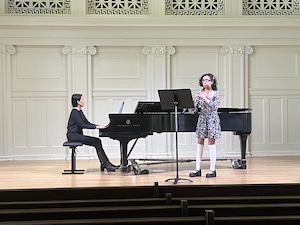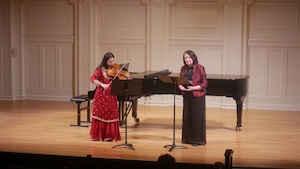Three years ago, the Music Institute of Chicago initiated a program entitled One Composer, One Community, focusing on an individual underrepresented composer each year. The composer is featured in a wide range of concerts, masterclasses, learning activities, and other programs for all levels and ages of students, from the very youngest players to the most advanced students in the Academy program. In 2004, Reena Esmail was chosen, the first time the program has featured a living composer.
Reena Esmail
Esmail is of Indian origin and lovingly straddles the intersection between western compositional technique and Indian classical music. As a student, she learned traditional western music, specifically piano and composition, and followed a standard training path. She studied at the Juilliard School for her undergraduate studies and Yale University for graduate studies.
Along the way, she became more interested in learning the music of India, receiving a Fulbright-Nehru grant to study Hindustani music, the classical music of northern India. Her compositions from this point on have frequently combined both western and Indian classical music elements, including both melodic and rhythmic structures. Many of her works are based on Indian ragas, which she describes as “scales with personality,” and incorporate Hindustani ornamented melodic figures, as well as slides and traditional rhythmic structures. These elements are paired with more western forms, instruments, and ensembles.
One Composer, One Community Workshops
For this year’s One Composer, One Community main event, Esmail visited the Evanston campus of the Music Institute of Chicago for a full day of workshops and a showcase concert. In addition to an open composition class, she worked with students, adults, and teachers by instrument family throughout the day, with separate workshops for piano, strings, winds/brass, and voice.
 It is difficult to express in words the magical feeling of this day. Every single workshop was thoroughly captivating, filled with new musical adventures and discovery, as students learned about her compositional process and the fundamentals of Hindustani musical techniques. She frequently demonstrated ideas by singing, embracing a collaborative approach, and asking students about their musical choices.
It is difficult to express in words the magical feeling of this day. Every single workshop was thoroughly captivating, filled with new musical adventures and discovery, as students learned about her compositional process and the fundamentals of Hindustani musical techniques. She frequently demonstrated ideas by singing, embracing a collaborative approach, and asking students about their musical choices.
CMPI oboe fellow Guadalupe Ramirez was one of the students featured in the winds/brass workshop, performing Jhula, Jhule (2014), a fantasy on an Indian lullaby originally sung by the composer’s grandmother. Esmail remarked on how this work, originally written for violin and piano, is exceptionally challenging on the oboe, as it leaves little room to breathe and the slides are not as easily accomplished on an oboe as a violin. Despite these challenges, Guadalupe masterfully shaped her phrases and seamlessly interacted with the pianist, Louise Chan, whose part primarily features repeated atmospheric melodic cells.
 The workshop sessions concluded with the most advanced Academy students rehearsing orchestral, chamber, and solo works. The string orchestra worked on two works for orchestra and tabla (Indian hand drums), a work for students entitled Acharanga and a much more challenging orchestral work called Testament. In addition to providing feedback on the repertoire, Esmail and the tabla player also explained the basic elements of Indian classical music to the students, including a thorough explanation of Hindustanti rhythmic patterns called taals.
The workshop sessions concluded with the most advanced Academy students rehearsing orchestral, chamber, and solo works. The string orchestra worked on two works for orchestra and tabla (Indian hand drums), a work for students entitled Acharanga and a much more challenging orchestral work called Testament. In addition to providing feedback on the repertoire, Esmail and the tabla player also explained the basic elements of Indian classical music to the students, including a thorough explanation of Hindustanti rhythmic patterns called taals.
Showcase Concert
 The day concluded with a showcase concert of Esmail’s work, including several works written or arranged just for this event, such as the stunning “Behta Jaa” from Sunaao for two sopranos and piano, and a four-hand piano study called “Kanyakumari.” CMPI viola fellow Neena Agrawal was featured in the showcase, performing a new arrangement of “Take What You Need” for viola solo and mezzo-soprano, a touching work that the composer described as containing the connecting motif between her and her husband, esteemed violinist Vijay Gupta. The concert concluded with CMPI faculty member Sang Mee Lee stunningly performing Esmail’s solo violin arrangement of Leonard Cohen’s “Hallelujah.”
The day concluded with a showcase concert of Esmail’s work, including several works written or arranged just for this event, such as the stunning “Behta Jaa” from Sunaao for two sopranos and piano, and a four-hand piano study called “Kanyakumari.” CMPI viola fellow Neena Agrawal was featured in the showcase, performing a new arrangement of “Take What You Need” for viola solo and mezzo-soprano, a touching work that the composer described as containing the connecting motif between her and her husband, esteemed violinist Vijay Gupta. The concert concluded with CMPI faculty member Sang Mee Lee stunningly performing Esmail’s solo violin arrangement of Leonard Cohen’s “Hallelujah.”
Sharing the Joy of New Music
Esmail stated that one of her most important tenets as a composer is a commitment to writing music for all levels and ages. She has written numerous student works, and even composed a series of Twinkle Variations for Suzuki students based on Hindustani syllables and rhythms that were introduced at the One Composer, One Community event. Her excitement at working with students of all ages during the event was palpable, and she stated several times how much she was learning from hearing students interpret her works. She approached the entire day with a refreshing attitude of collaboration.
Over the course of the weekend, Esmail worked one-to-one with more than 70 students, many meeting a living composer for the very first time. She peppered her workshops with stories and anecdotes from her life, demonstrating again and again to the students that composers are real people with real and very human lives.
This event was truly magical for all involved. It was more than a learning experience for the participants – it was a new way to look at the creation of music, be inspired by it, understand its purpose and value, and shape it into something new.
Images
CMPI Fellow Neena Agrawal and MIC faculty Barbara Martin (voice) coached by Reena Esmail; CMPI Fellow Guadalupe Ramirez with MIC faculty Louise Chan (piano); Neena Agrawal and Barbara Martin; MIC Academy orchestra with Reena Esmail
